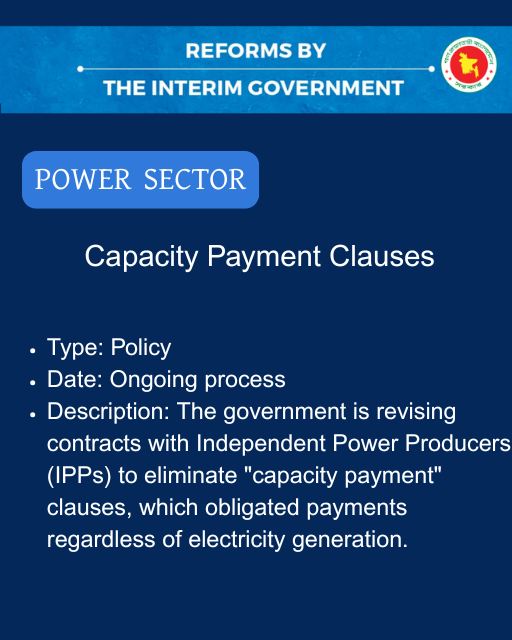As part of sweeping reforms in the power sector, the interim government has initiated a review of contracts with Independent Power Producers (IPPs) to eliminate “capacity payment” clauses—provisions that obligate the government to pay for power generation capacity even when no electricity is actually supplied to the grid.
The move was first disclosed on Friday through the verified Facebook page of the Chief Adviser to the interim government.
“The government is reviewing agreements with IPPs to eliminate capacity payments, which have long required the Bangladesh Power Development Board (BPDB) to make payments regardless of actual electricity generation,” the statement read.
Currently, capacity payments range from US$10–12 per kilowatt per month for gas and liquid fuel-based power plants, and US$20–25 per kilowatt per month for coal-fired plants. Officials informed a visiting delegation from the International Monetary Fund (IMF) that 1,000 MW of excess capacity in gas or liquid fuel plants could result in an additional annual cost of US$120–144 million for BPDB. In the case of coal-fired plants, the annual cost could rise to US$240–300 million—costs that ultimately require government subsidies.
To address this, two committees have been formed to review capacity payments made to IPPs and joint venture power plants. These committees are currently examining existing Power Purchase Agreements (PPAs) to identify ways to reduce BPDB’s financial burden from such charges.
The reform drive officially began on February 23, 2025, when the Ministry of Power decided to review all PPAs, under the leadership of Power and Energy Adviser Dr. Muhammad Fouzul Kabir Khan.
As part of these reforms, nine cost-saving initiatives have already been implemented. Notably, a revision to the coal pricing formula in the Adani Power deal is projected to save Tk 114.44 billion in private power purchases.
In addition, three joint-venture coal-fired power plants—Bangladesh-India Friendship Power Company, Bangladesh-China Power Company, and RPCL-Norinco Power Plant—have been directed to review and correct inconsistencies in their PPAs to improve transparency and accountability.
Moreover, 23 government-owned power plants under entities such as NWPGCL, APSCL, EGCB, RPCL, and BRPL have been instructed to reassess their agreements. This step alone is expected to save the government Tk 26.30 billion annually.
According to the Power Division, the total estimated savings from these reforms will amount to Tk 140.74 billion in the fiscal year 2025–26.
Speaking to Just Energy News on the issue, Bangladesh Independent Power Producers Association (BIPPA) President David Hasnat said, “It’s not feasible to eliminate capacity payments from existing PPAs, as these clauses were legally included in the original contracts.” However, he noted that such clauses could be avoided in future projects, particularly in renewable energy ventures such as solar.
Hasnat added that private power producers are willing to sit with the government to discuss the issue further. He thanked the authorities for clearing outstanding electricity bills and waiving liquidity demurrage up to June, a measure taken to account for payment delays. “At present, we have no overdue payments,” he noted.
Despite having an installed capacity of around 5,000 MW, IPPs are currently supplying only about 2,500 MW to BPDB, he said. He also emphasized the need for a reserve margin of over 30 percent, as a global standard, especially given that Bangladesh depends on imports for 60 percent of the fuel used in power generation.
BPDB Chairman Engr Rezaul Karim underscored the importance of cooperation from IPPs and joint ventures in revisiting PPAs as part of the government’s cost-cutting efforts.
Power and Energy Adviser Dr. Muhammad Fouzul Kabir Khan stated, “Reviewing PPAs to reduce generation costs is essential for keeping electricity tariffs stable for consumers.”
Currently, the country’s total power generation capacity stands at 28,000 MW, against a demand of approximately 18,000 MW.

